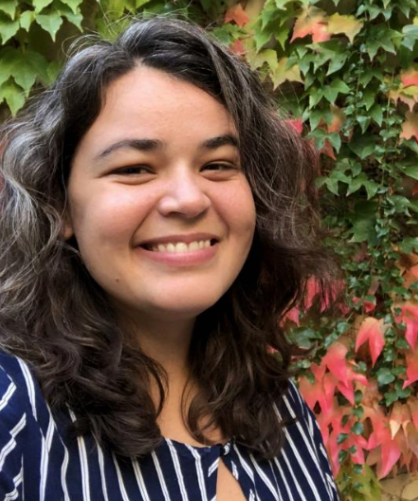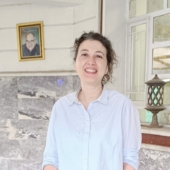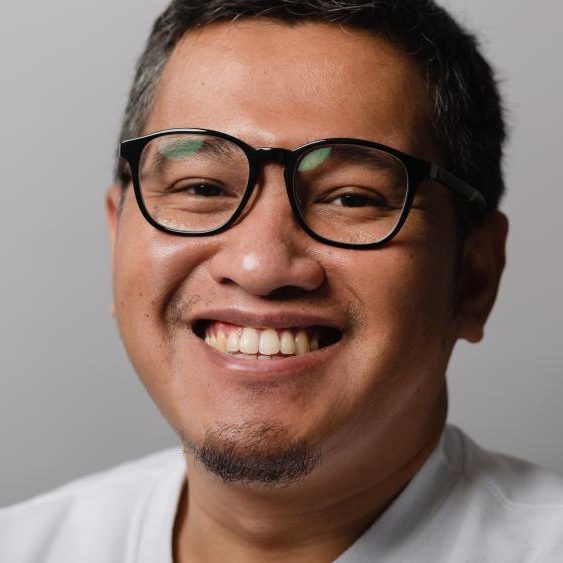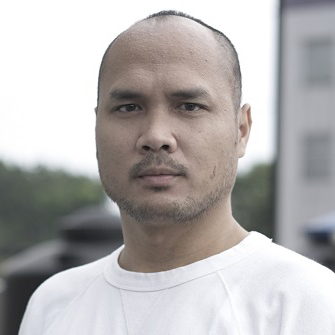In September, the first two fellows of the NIAS-NIOD-KITLV Moving Objects, Mobilising Culture in the Context of (De)colonisation start their research projects. The fellowship enables researchers and heritage professionals from former colonized countries to conduct five months of research into ‘colonial collections’: objects and collections from those countries that arrived in the Netherlands in a context of colonialism. NIOD is involved in the fellowships as partner of the Colonial Collections Consortium..
The first two fellows, Caroline Fernandes Caromano and Nadia Aït Saïd-Ghanem start their research in September 2024. In February 2025, the next two fellows, Panggah Ardiyansyah and Theo Frids Hutabarat, are welcomed. Below, you can find more information about the fellows and their research projects.

Caroline Fernandes Caromano – (Re) Interweaving past and present
Caroline Fernandes Caromano is a Brazilian archeologist with academic degrees from the University of São Paulo and the National Museum of the Federal University of Rio de Janeiro (Brazil). She has been a research fellow at the Museum of Archeology and Ethnology of the University of São Paulo, the Museum Emilio Goeldi (Brazil), Leiden University, the Research Center for Material Culture, and the Naturalis Biodiversity Center (the Netherlands).
Project description
At NIAS, Caroline will revisit artworks from the period of the Dutch colonial administration in Brazil constructing a transatlantic dialogue with Indigenous and Afro-Brazilian artisans from the State of Maranhão, the last frontier conquered by the Dutch. Using basketry as a point of discussion on the peoples and material culture portrayed by Eckhout, Post, and others, the research inquires how baskets can shed light on the historical representations of marginalized segments of the Brazilian population and their political agency in the past and present. By amplifying the voices of artisans from small communities in Maranhão to the interior of the Royal Dutch Academy of Arts and Sciences, the research proposes to create a space for interpretation and recontextualization of the artworks based on Quilombola and Indigenous epistemologies.

Nadia Aït Saïd-Ghanem – Cuneiform tablets in Dutch museums and the Iraqi-French antiquities dealer Ibrahim Elias Gejou
Dr Nadia Aït Saïd-Ghanem is a provenance researcher and cuneiformist. She is a graduate of SOAS, University of London, UK, where she studied Akkadian, Sumerian, and Arabic, and obtained her PhD (Department of the Near and Middle East). Her primary research interests are cuneiform, Arabic grammatical theory, and the purchase of Iraq’s tangible heritage by museums in Europe and America from antiquities dealers. Since her British Academy Postdoctoral Fellowship (2019-2023), she has been investigating Iraqi antiquities dealers’ correspondence preserved in museum archives to write the provenance history of archaeological artefacts from Iraq, primarily cuneiform tablets, purchased from these dealers by museums between 1884 (the year in which the Ottoman Antiquities Law forbade the exportation of such objects) and WW1.
Project description
As a NIAS-NIOD-KITLV Fellow, Dr Aït Saïd-Ghanem will focus on cuneiform tablets sold to Dutch museums by the antiquities dealer and smuggler Ibrahim Elias Gejou before and after Iraq’s Antiquities Law of 1936. This study is based on correspondence between Gejou and curators of Dutch museums, held in Dutch archives today.

Panggah Ardiyansyah – Evocative Fragments: Archaeological Knowledge Production for Sendang Duwur and Its Dispersed Objects
Panggah Ardiyansyah wants to understand why an Islamic site has been marginalised (or not) within Indonesian archaeology, despite the fact that the majority of the population in Indonesia is Muslim.
Project description
The research aims to deconstruct the knowledge production of Sendang Duwur, a 16th-century Islamic complex in East Java, Indonesia. In doing so Panggah Ardiyansyah wants to contribute to the developing scholarship on heritage politics in relation to identity formation, inclusion/exclusion and frameworks of restitution.
The project activities are divided into three parts: tracing the relationships between historical figures involved in the circulation of Sendang Duwur manuscripts, reconstructing the interventions of the Archaeological Service of the Dutch East Indies at Sendang Duwur in the first half of the 20th century, and outlining the entangled movements of manuscripts and artefacts associated with the site.

Theo Frids Hutabarat – Reimagining Pustaha
How can the pustaha be connected to the common Batak people today? Could the knowledge in the pustaha be applied to local environmental activism? Is it possible to comprehend the pustaha through artistic means?
Project description
Theo Frids Hutabarat’s project focuses on the Batak manuscripts known as pustaha and how museums in the Netherlands take care of them. He aims to study the life of these manuscripts in their current setting, far from their origin in Sumatra, Indonesia. By creating a local network that connects with the institutions housing these manuscripts, Hutabarat plans to swap certain care methods with other methods, causing a ‘glitch’ in the existing care system.
Using a collaborative approach, the project seeks to deepen the understanding of the past by exploring Batak spirituality, not just focusing on ancestors and rituals but also on political, social, and environmental histories. Pustaha are viewed as vital for rebuilding the spiritual world of the Batak people within new societal frameworks.
The project will reflect on how pustaha are interpreted (or not) and to reimagine them as a lived experience in living communities. This research aims to start the long process of reconnecting the manuscripts and their knowledge back to the Batak people.
During this interdisciplinary symposium, the Grotius Centre for Legal Studies and the Research Group ‘Museums, Collections and Society‘ from Leiden University, will focus on the changing approaches towards the restitution of objects from a colonial context. The aim is to look beyond individual country approaches and ethical policies to explore what comparative lessons can be learned from different contexts regarding the treatment of cultural objects and/or human remains.
Date: 23 – 24 May 2024
Time: 09:30 AM – 17:00 PM (CET)
Language: English
Location: Wereldmuseum and Leiden University
Organizers: Grotius Centre for Legal Studies and the Research Group ‘Museums, Collections and Society’
The concept of decolonising the museum, means different things in different parts of the world. ICOM, the International Council of Museums, established a Working Group on Decolonisation. During this conference on 17 June 2024, the Working Group will share experiences from their daily practice, offering a broad variety of perspectives.
Speakers from Barbados, Benin, Canada, India, Nigeria, Pakistan, Taiwan and Zambia, as well as from European countries, will shed light on what decolonisation means for their work. Discussions will include how to decolonize archival and artifact collections, how to work with diaspora communities and Indigenous peoples to reconcile colonial histories and how to renew conventional colonial museums and unpack colonial legacies.
Date: 17 June 2024
Time: 09:30 AM – 4:30 PM (CET)
Language: English
Location: Amersfoort (the Netherlands) and online
Organizers: Cultural Heritage Agency of the Netherlands, in collaboration with ICOM, ICOM Netherlands, DutchCulture and UNESCO NL
On 27 May 2024, MAS and FARO are organizing a seminar on provenance research concerning heritage from a colonial context. During this seminar, practical experience is combined with theoretical background to discuss provenance research into heritage from a colonial context and related topics, such as digital restitution and collaboration with communities of origin. In addition, the results of the MAS-project concerning provenance research into the museum’s Congolese collection will be presented during the seminar.
Date: 27 May 2024
Time: 09:30 AM – 4:00 PM (CEST)
Speakers: Lies Busselen (KU Leuven), Randy Kalemba and Pauline Malenga (Intellectuele Congolese Kring), Vicky Van Bockhaven (Ghent University), Camiel de Kom (Colonial Collections Consortium), and more.
Language: Dutch
Location: MAS, Hanzestedenplaats 1, Antwerp
Organizers: MAS and FARO
The Call for Applications for the exchange programme Sharing Stories on Contested Histories is now open. Urgent societal challenges such as the climate crisis, social injustice, economic inequality and the threat to democracy are urging museum and heritage professionals to reflect on their role in society and on their own working practices. Many of these issues have a deep connection to our recent and less recent past, and to the histories and practices of museums themselves. The 2024 edition of the Sharing Stories on Contested Histories programme will explore how striving for equity may look like in the heritage sector, by stimulating and facilitating an exchange of knowledge, tools and experiences regarding professional practices. Dealing with collections from a colonial context is one of the topics that will be discussed during the programme.
This programme is organized by the Cultural Heritage Agency of the Netherlands and the Reinwardt Academy (Amsterdam University of the Arts) as part of the International Heritage Cooperation programme.
The deadline to apply is 29 June 2024. See the full Call for Applications for more information about the content and the application process.
Webinar Collections from a Colonial ContextThe colonial past has left traces in the collections of Dutch museums and other institutions. Because of the imbalance of power, many objects were removed from their countries of origin and brought to the Netherlands and became lost to communities. The current Dutch policy on colonial collections aims to help rectify this historic injustice by facilitating requests for restitution of cultural heritage objects from countries of origin, by working towards openness and transparency about collections in the Netherlands, and by strengthening international collaboration on these collections. This webinar is specifically curated for an audience based in the Caribbean part of the Kingdom of the Netherlands.
This webinar has already taken place. Rewatch it below.
Practical information
Date
24 April 2024
Time
10:00 – 11:30 am (AST) / 4:00 –5:30 pm (CET)
Audience
Heritage professionals, (provenance)researchers, policy makers, cultural heritage organizations, community leaders from Aruba, Bonaire, Curaçao, Saba, Sint Eustatius and Sint Maarten.
Admission
No fee. Registration is needed to receive the Zoom link.
In short
- Ask questions regarding the presence of, research to, and restitution procedure of cultural heritage collections
- Get acquainted with available resources and funds for provenance research and cooperation.
- Exchange with museums in the Netherlands on how they deal with dilemmas surrounding colonial collections.
- Understand the background of the current policy on colonial collections and the roles and responsibilities of organizations involved in the Netherlands.
More information about this webinar
In this online webinar we will provide specific information about the current Dutch policy on colonial collections in relation to the 3 countries and 3 public bodies located in the Caribbean region. We also want to provide room for questions regarding the presence of, research to, and the procedure of restitution of cultural heritage collections.
This webinar is organized in collaboration with the Colonial Collections Consortium. The Consortium is established to provide information on colonial collections policy, relevant organizations and experts, networks and opportunities for cooperation and knowledge exchange. The Consortium aims to be a central point of contact for countries of origin for questions about collections from a colonial context and provenance research in the Netherlands. In this webinar we will provide attendees with available resources for further research and collaboration.
For whom?
Are you a heritage professional, (provenance)researcher, policy maker, community leader based in the Caribbean part of the Kingdom of the Netherlands? And/or are you interested in (the study of) cultural heritage objects and collections in the Netherlands and policies regarding restitution? Please feel free to sign up for this webinar.
How can I sign up?
You can register for this webinar via the link below. One week in advance you will receive a confirmation email with links to the Zoom meeting as well as preparation materials that we would like you to study in advance.
First inventory of objects from Suriname in the Netherlands15th of April, 2024
At the beginning of April, a Netherlands delegation visited Suriname, during which agreements were made about cooperation in the field of colonial collections. For this visit, the Colonial Collections Consortium mapped out which objects are present in Dutch public collections through the colonial history of the Netherlands and Suriname. This effort follows from the Dutch policy on handling objects that are brought from previously colonized areas and are now managed in the Netherlands.
The policy, aimed at redressing injustice, focuses on cooperation with countries of origin, processing a request for restitution and supporting provenance research. But where in the Netherlands can you find these cultural objects? How do you get information about these objects? And how are they described? The inventory answered some of these questions by zooming in on objects connected to the colonial history of the Netherlands and Suriname.
Inventory
For this first inventory, twenty-eight institutions that manage (part of) the national collection on behalf of the Dutch State were asked to examine their own collection, using a questionnaire. Twenty regional museums with a possible link with Suriname have also been contacted. By having the quick scan carried out by the institutions themselves, optimal use was made of their knowledge and experience with their own collection and its accessibility.
It is important for the reader to realize that the information in the inventory is limited to the institutions that responded and the data they shared. This first inventory is therefore far from exhaustive. Sometimes there is a backlog in collection registration, which means that institutions were unable to provide the requested information. Sometimes objects are not registered in a way that shows the connection with the colonial history of the Netherlands and Suriname. And sometimes there are obstacles due to the search options of a registration system. But for those who would like to conduct research into objects from Suriname that are managed in institutions in the Netherlands, this first inventory can provide a starting point.
The inventory is only available in Dutch
This document was shared with the National Museum Committee Suriname during the working visit of the Dutch delegation.
International Provenance Research DayTogether, we can gain a better understanding of the meaning and provenance of objects
Provenance research is an important part of collection management. On Wednesday 10 April, more than 100 institutions from the international field pay extra attention to this during International Provenance Research Day with publications and activities such as guided tours and presentations. This day is an initiative of the Arbeitskreis Provenienzforschung and has taken place on the second Wednesday of April every year since 2019.
Provenance research maps the provenance history of objects. It provides insight into the history of owners of an object after it has been taken out of its original context. As part of my Heritage and Memory Studies programme at the University of Amsterdam, I, Josien Franken, am doing an internship at the Cultural Heritage Agency of the Netherlands (RCE). I chose to pursue this internship because I am specifically interested in how collections from a colonial context are handled. Inspired by the International Provenance Research Day, I posed some questions to Klaas Stutje (NIOD Institute for War, Holocaust and Genocide Studies) and Cindy Zalm (Wereldmuseum, National Museum of World Cultures). Together with Museum Bronbeek and Rijksmuseum Amsterdam, the RCE, NIOD and the Wereldmuseum form the Colonial Collections Consortium. I know that the Consortium supports collecting institutes in provenance research, but what does that actually entail? I am curious to hear what Cindy and Klaas can tell me about this.
Central to the Dutch policy on dealing with collections from a colonial context is the aim to redress historical injustice. Can you explain how provenance research can contribute to this?
Cindy: “Doing provenance research gives us a better understanding of how objects were obtained in colonial territories and came to the Netherlands. It forces us to recognise which violent events were part of these colonial histories and allows us to engage in a dialogue about the importance of these objects for countries of origin. It also makes it possible for these countries to request restitution of these objects.”
What kind of collaboration with countries and communities of origin is looked-for in this process?
Cindy: “Many objects have been taken out of the context of the culture within which they were made. Knowledge has usually been lost as a result. People in countries of origin often know things about the objects that we do not. Together, we can gain a better understanding of the meaning and provenance of the objects. Furthermore, when the decision is made to restitute objects, it is important to talk with each other about how to do so. Precisely because restitution is only part of the whole restoration process.”
In the Pilot project Provenance Research on Objects of the Colonial Era research was conducted on provenance history and significance of cultural objects and collections acquired in colonial situations. What are the main lessons from this pilot project?
Klaas: “My answer to this question is twofold. On the one hand, our provenance research on 65 objects from the Rijksmuseum and the Wereldmuseum showed that focused research almost always leads to interesting new insights and additional information. On the other hand, it also showed that in only a minority of cases such research yields concrete clues about the moment of colonial acquisition itself. Moreover, experience in doing archival research and an awareness of the inherently colonial nature of source material are important when doing such research. Provenance research is thus a fruitful activity, but it also raises difficult questions and issues.”
Provenance research is one of the core tasks of institutions managing collections. In what way does the Consortium help them carry out this core task?
Klaas: “First of all, we are building a digital platform that brings information about various collections from colonial context together, enriches it and makes it accessible. By linking their own collection registration systems to this datahub, institutions can more easily recognise the relationship between their own collection and other collections. Furthermore, we are creating a comprehensive series of digital search tools for additional in-depth research on objects, collectors or collections. We also hope that institutions will learn and benefit from the knowledge and perspectives of researchers from countries of origin who can come to the Netherlands on fellowships. But ultimately, institutions themselves have to take steps to study their collections and make them accessible.”
The datahub is a digital platform that brings together information about collections from colonial contexts. How does the datahub make provenance information accessible and how does it provide insight?
Cindy: “The datahub makes it possible to search through multiple collections simultaneously. The application includes a timeline. If a collection manager has provenance information, these are presented as a dot on the timeline. Many collection managers record provenance in separate reports or free text fields. These are often difficult or impossible to search through within a computer application. The datahub structures this information where possible. Moreover, it allows researchers in both the Netherlands and countries of origin to add knowledge about the objects and their origins.”
For the digital search tools and fellowships, how does the Consortium work together with countries and communities of origin?
Klaas: “The visits of fellows to the Netherlands and the development of digital search tools can hopefully be mutually reinforcing. Due to language barriers and unfamiliarity with the complicated history of Dutch heritage institutions, researchers from abroad often find research here complicated. Parallel to the fellows’ visits, we hope to create search tools to facilitate them in their research. We also actively learn from the research questions from countries of origin that we take away from webinars, expert meetings and individual encounters. In return, we hope that greater openness and transparency, including through the digital search tools, can foster new research and help restore broken links with cultural objects in the Netherlands.”
Thank you, Cindy and Klaas, for answering my questions. I have a better understanding now of how provenance research can help redress historical injustice, that the knowledge of people in countries of origin is essential to understand the original context of objects, and that the Consortium is working on a datahub, which will allow multiple collections to be searched simultaneously and offers possibilities for adding knowledge about the objects and their provenance. I look forward to following the Consortium’s future activities.
Do you also have questions for the Consortium? Please contact the Bureau through the contact page.
Curious about the datahub?